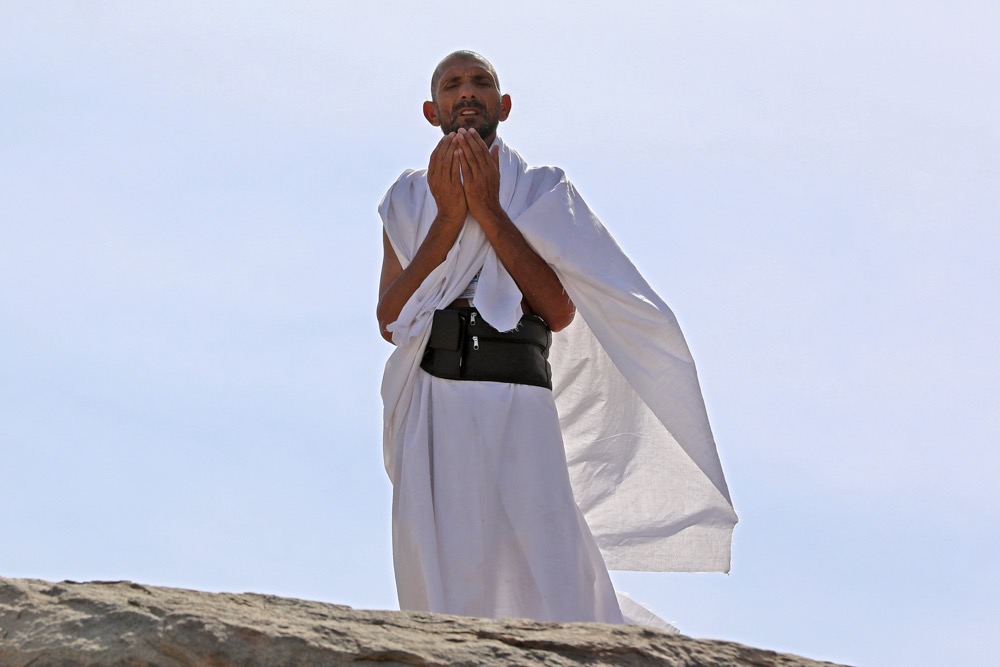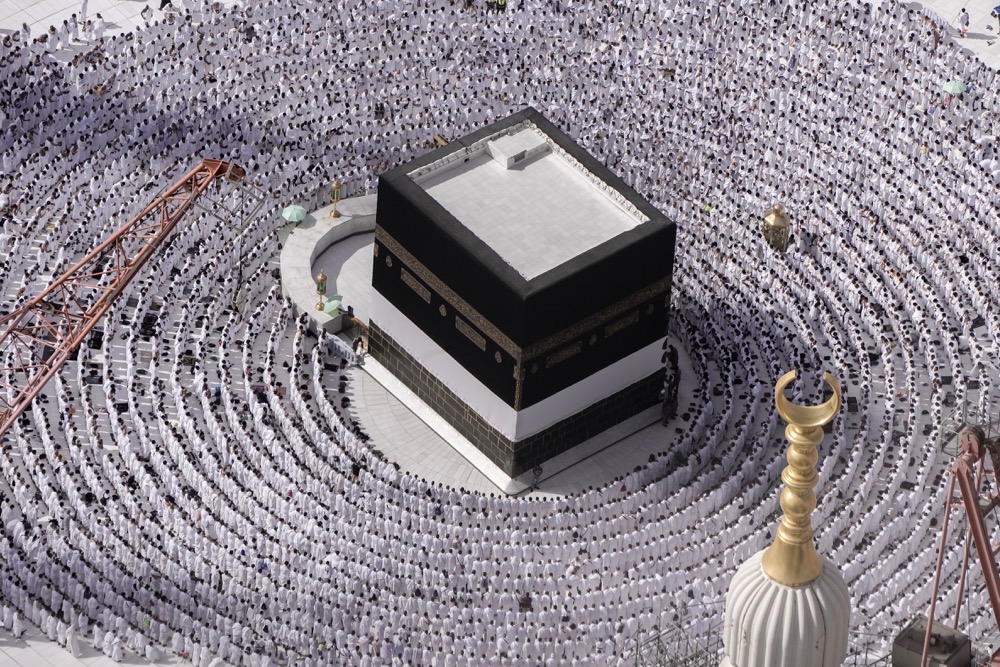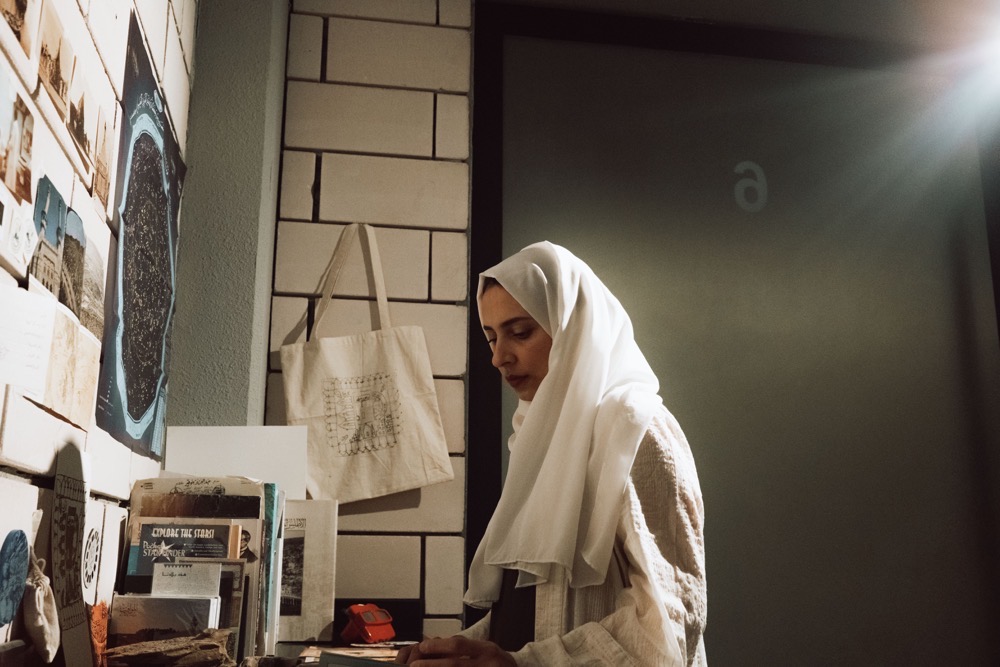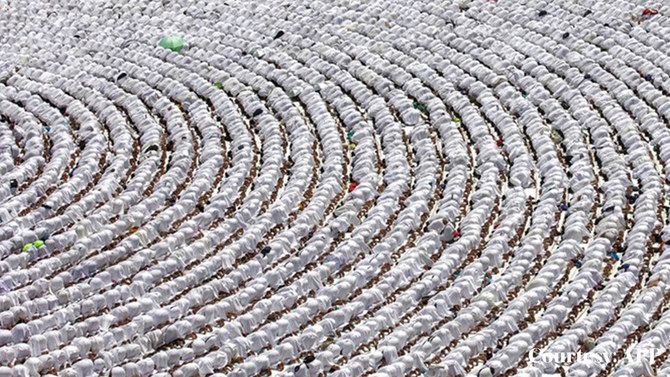DUBAI: Muslims from all around the world arrived in Makkah over the past few weeks ahead of the annual Hajj pilgrimage, which began on Monday. Though participation in this holy tradition is strictly restricted to followers of Islam, the increasingly open nature of the Kingdom means that it also offers a valuable opportunity for cross-cultural dialogue and understanding.
Hajj is one of the Five Pillars of Islam, after profession of faith, prayer, charitable deeds and fasting. It is a highly symbolic act of worship that draws together Muslims from around the globe, irrespective of race, class, culture or nationality, to walk in the footsteps of the many millions who have made the intense spiritual journey before them.
“Hajj is an incredibly special time of the year for us,” Kumail Almusaly, a curator at Ithra, the King Abdulaziz Center for World Culture, who recently co-curated an exhibition on Hijrah (the journey of the Prophet Muhammad and his followers from Makkah to Madinah), told Arab News.
“It is not just a religious obligation but a chance to come together with millions of Muslims from all over the world in a shared experience of connection and unity in a unique spiritual environment.”

A pilgrim prays atop Mount Arafat. (AFP)
All Muslims are required to complete the five-day Hajj pilgrimage at least once during their lives if they are physically and financially able to do so. It is a deeply moving spiritual experience that they believe absolves their sins and brings them closer to God, and it serves to unite the world’s 1.8 billion Muslims.
Through Hajj, Muslims from all walks of life are reminded of the importance of their connection to God and “contributions to humanity,” said Almusaly.
“The pilgrimage represents a fresh start, a chance to clear away any dissonance that may have accumulated over the years and begin anew with a sense of purity and purpose.”
The Arabic word Hajj translates as “to intend a journey,” or the metaphorical idea of continuously striving, even in the face of adversity, to achieve one’s goals.
While the traditions of Hajj are chiefly associated with the life of the Prophet Muhammad, who founded the pilgrimage in 632, the year of his death, Muslims believe the Hajj rituals date thousands of years further back, to the time of Abraham.
According to Islamic beliefs, Abraham built the Kaaba, at Allah’s instruction. It is the cubed structure that stands at the heart of Masjid Al-Haram, or the Grand Mosque, in Makkah, which is the holiest site in Islam. Pilgrims dressed in white robes walk around the Kaaba during Hajj, offering prayers.

Pilgrims pray around the Kaaba at the Grand Mosque. (AP)
The Hajj pilgrimage and the rituals associated with it are arduous and demanding. According to the Islamic faith, they reflect the rituals first performed by Abraham, his wife Hajar, and their son Ishmael, and later by the Prophet Muhammad.
Just as Islam, Christianity and Judaism all trace their common roots back to Abraham, so too do they share a common set of values, including faith, compassion and humility, which are also reflected in the core message of Hajj.
Indeed, as the Kingdom increasingly opens up to the outside world, thanks to the social reforms and economic transformation plan under Saudi Vision 2030, Hajj offers a rich opportunity for Saudis, pilgrims from other countries, tourists and foreign residents to celebrate these shared values and acknowledge their common roots.
“Its message is one of faith, compassion, humility and oneness, and it is appreciated by people of all faiths and backgrounds,” said Almusaly.
The places where pilgrims have traveled from and their social status in their home countries are immaterial during Hajj. The belief that resonates with all pilgrims is one of humility and the complete surrender of self-importance.
In the words of the Prophet: “All mankind is from Adam and Eve. An Arab has no superiority over a non-Arab, nor does a non-Arab have any superiority over an Arab; a white has no superiority over a black, nor does a black have any superiority over a white; (none has superiority over another) except by piety and good action.”
The view among pilgrims is that Islamic teachings of piety, kindness, virtue and equality are values that span cultures, connecting all faiths, nations and social classes. Hajj therefore provides opportunities for locals and foreign visitors to the Kingdom to perform and witness acts of charity and generosity.
Rawan Al-Selhi, a Saudi jewelry designer, told Arab News that Hajj is a time when Muslims are reminded to help fellow pilgrims, especially those who have had fewer economic opportunities, “for example by urging the postponement of prayers in the Prophet’s Mosque as much as possible to create more space for pilgrims coming from abroad.”
She added: “Such simple acts have built a different relationship between us, the pilgrims, and visitors. Science has also developed and the means of comfort have evolved, and Saudi Arabia has invested in technology to offer pilgrims an unforgettable pilgrimage trip.”
Al-Selhi, who grew up in Madinah, said her first jewelry collection was inspired by the architecture of the Prophet’s Mosque in the city.
“Madinah is the destination and the first stop for pilgrims and visitors before they leave for Makkah,” she said. “For my generation, our parents try to talk to us about this time, and the importance of prayer and becoming closer to God. It is a time of optimism for the coming year.”
She recalled how her grandfather would help pilgrims and other visitors to the Kingdom during Hajj.
“He would open his home during the month and host others in need of a place to stay,” she said. “This resulted in an exchange of cultures and experiences. Some Saudi families even moved out of their homes to leave them free for pilgrims and visitors from abroad.”

The undated photo shows Saudi designer and visual artist, Nahla Khogeer. (Photo courtesy: Nahla Khogeer)
Nahla Khogeer, a designer and visual artist in Jeddah, said the Hajj pilgrimage has made a deep impression on her work.
“My grandfather, father and uncles all worked as guides during the Hajj and Umrah seasons,” she told Arab News. “The relationship with my father has had a great impact on my interest in the Hajj journey and what I experienced in my childhood.”
Khogeer recalled how she often went with her father to Makkah to watch him work and took photographs of many of the places related to Hajj, from which she created postcards that she gave to pilgrims to take home as mementos of their pilgrimage.
“It is these experiences with my father during Hajj that have inspired my work, especially since he passed away,” she said. “Their memory now lives in my work.”
This year’s Hajj is the first since travel restrictions related to the COVID-19 pandemic were lifted, and Saudi authorities expect about 2.5 million pilgrims to take part in Hajj this year, one of the largest numbers ever.
Al-Selhi and Almusaly said the Kingdom views Hajj not only as a pillar of the Islamic faith but as an event that unites the Saudi people and, in this new era for the Kingdom, reflects the great social and economic strides the country has taken in recent years, along with its growing openness to the wider world.
“In a world that can often feel divided and disconnected, Hajj serves as a powerful reminder of our shared humanity and the importance of coming together in pursuit of the greater good,” said Almusaly. “It is a time of renewal and rejuvenation.”




























